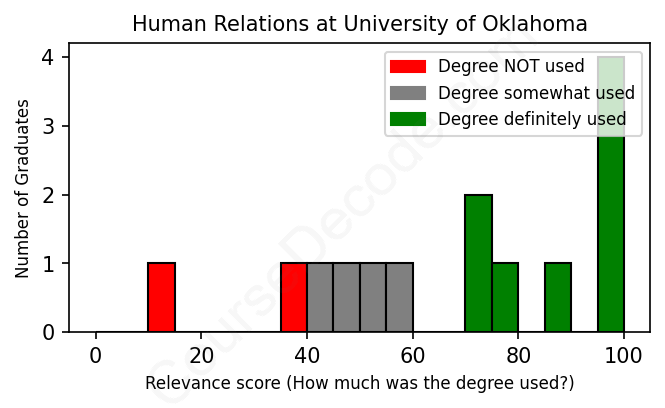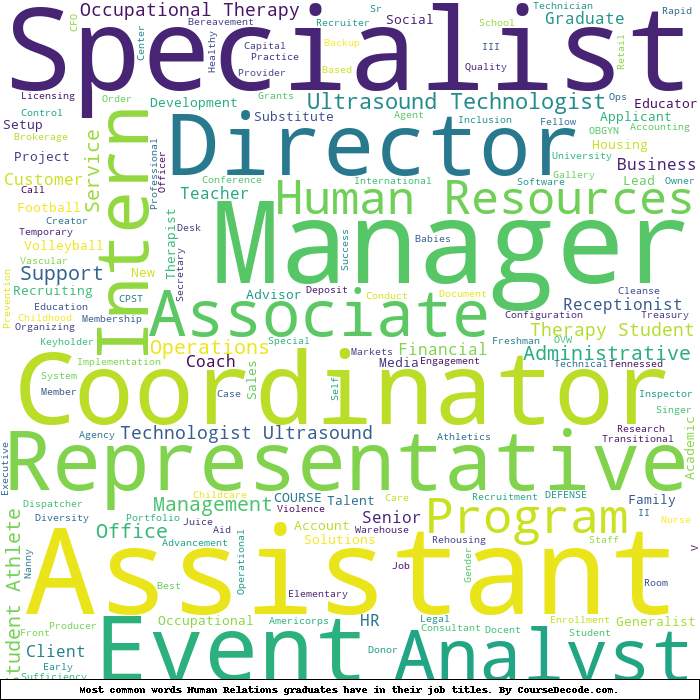
First, some facts. Of the Human Relations graduates from University of Oklahoma we've analyzed , here's how many have used (or NOT used) their degree in their career:

These are estimates based on AI analysis of 14 LinkedIn profiles (see below).
The verdict? On par with the average. Overall, with an average relevance score of 67%, Human Relations graduates from University of Oklahoma have about the same likelihood of finding work in this field as the average graduate across all fields:
And for comparison, here's the chart for all profiles we've looked at across all degrees.
Also, after graduating, 35% of these graduates have pursued further education other than another Bachelor's degree (such as a Masters degree or other), which is right in line with the average across all fields.
See the details:
|
Relevance score: 89% We think this person has gone into a career highly relevant to their degree. We think this person has gone into a career highly relevant to their degree.
DEGREE INFOGraduated in 2011 from University of Oklahoma with a Bachelor's degree in Human Relations. No other secondary education since. JOB HISTORY SINCE GRADUATIONTechnical Document Assistant SAIC Nov 2011 - Jun 2012 Software Configuration Management Analyst  SAIC Jun 2012 - Jul 2013 IT Ops Support Analyst V  Hewlett-Packard Aug 2013 - Jun 2015 Business System Analyst  CBRE Jun 2015 - Present Capital Markets Operations Manager  CBRE Apr 2018 - Present ABOUTNo information provided. |
The top 10 most common jobs done by the graduates we've analyzed (ranked most common to least) are:
People who graduated with a degree in Human Relations from the University of Oklahoma seem to have landed a variety of jobs, but there are definitely some common themes. A lot of them ended up in roles related to event planning and coordination, like Event Coordinators and Event Producers, which make good use of their interpersonal skills and understanding of human relations. Many also ventured into Human Resources positions, such as HR Assistants and Analysts, where their education is particularly relevant because these roles often require a deep understanding of people and relationships in the workplace. Other notable positions include Project Managers and various roles in the education sector, which sometimes involve supporting and managing teams or students, allowing them to use those negotiation and conflict resolution skills they picked up in their studies.
However, not all the jobs these graduates pursued seem closely linked to their Human Relations education. Many landed in roles that, while they may involve some interaction with people, are more focused on administrative tasks, sales, or technical fields. Jobs like Sales Associates or Administrative Assistants often don't require the same depth of understanding of human interactions that a Human Relations degree provides. Overall, while there's a mixed bag of roles represented here, it appears that a solid chunk of these professionals managed to find positions where their degree's principles applied well, particularly in HR-related positions and those that require strong interpersonal abilities. But there's also a significant number of them working in jobs that don't fully utilize their training, which is a bit of a bummer considering the effort they put into their education. It shows that while having a degree can open doors, the connection between what you study and what you do isn't always as strong as you'd hope!
Here is a visual representation of the most common words in job titles for Human Relations graduates (this is across all Human Relations graduates we've analyzed, not just those who went to University of Oklahoma):

So, if you're looking at the career paths of folks who majored in Human Relations at the University of Oklahoma, it seems they're generally navigating towards a variety of roles that are quite relevant to their field. Many graduates kick off their careers in roles related to event planning or administrative support, like event coordinators, HR assistants, and office administrators. It shows that their first jobs often capitalize on skills in organization and communication—key aspects of human relations. As time progresses, we see a shift where individuals start taking on more specialized roles, particularly in HR and management positions, which indicates a solid career growth trajectory.
Fast forward about five to ten years, and many are well entrenched in fields like human resources, project management, and service-oriented roles. Some have found success in management positions within companies like Paycom and even institutions in athletics. Others have ventured into non-profit work or community service roles, demonstrating that a degree in Human Relations opens plenty of doors that can lead to meaningful careers. While some paths show volatility, with individuals hopping between different types of jobs or industries, there's a noticeable trend where people are either finding their niche or shifting into roles reflective of their skills and interests related to human relations. Overall, it looks like a mixed bag, but there are definitely plenty of success stories among these graduates, particularly those who leaned into HR-related jobs where there seems to be substantial career advancement.
Honestly, a Bachelor’s degree in Human Relations is generally considered to be on the easier side of the academic spectrum, especially compared to some of the more rigorous degrees in fields like engineering or the sciences. At the University of Oklahoma, like many other schools, the program focuses a lot on understanding people, communication, and social dynamics, which can be a lot more about discussion and projects than tough exams or complex math. You’ll definitely still have to put in effort and keep up with readings and assignments, but if you're someone who enjoys interacting with others and studying human behavior, you might find it pretty manageable and maybe even fun! Just make sure to stay organized and engaged, and you should do just fine.
Most commonly, in the LinkedIn profiles we've looked at, it takes people 4 years to finish a Bachelor degree in Human Relations.
Alright, so let's break it down. It looks like the graduates from the University of Oklahoma have had a pretty mixed bag when it comes to making decent money. Some of the earlier grads, like the ones who worked in event planning or entry-level sales positions, probably didn't pull in a ton initially, but it seems like they moved into better roles over time, especially those who worked their way up at companies like Paycom or in sports management. Meanwhile, folks like the ones in occupational therapy and human resources seem to be on a solid path, landing good job roles that typically pay well. Others are still on the grind in social services and education, which can be fulfilling but may not pay as much. Overall, while some are definitely doing well, others are still working their way up the ladder, so it’s a mixed picture on the money front!
Here is a visual representation of the most common words seen in the "about" section of LinkedIn profiles who have a Bachelor degree in Human Relations (this is across all Human Relations graduates we've analyzed, not just those who went to University of Oklahoma). This may or may not be useful:

Here are all colleges offering a Bachelor degree in Human Relations (ordered by the average relevance score of their Human Relations graduates, best to worst) where we have analyzed at least 10 of their graduates:
| College | Score | Count |
|---|---|---|
 University of Oklahoma University of Oklahoma
|
67 | 14 |